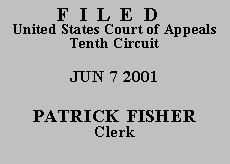

| ERVIN LEE McCOY,
Plaintiff-Appellant, |
|
| v. | |
| GARY DAMRON; M. CORY; JEFF
WHITE; LT. DUGAN; LT. HOLT; J.
CALLAGHAN,
Defendants-Appellees. |
|
Plaintiff Ervin Lee McCoy, appearing pro se, appeals the district court's dismissal of his 42 U.S.C. § 1983 and state-law false imprisonment claims. We affirm.
McCoy was arrested shortly after a shooting in downtown Oklahoma City on July 22, 1998. He was transported to the Oklahoma City detention center and booked on charges of shooting with intent to kill. On September 1, 1999, a jury found him not guilty of the charge.
McCoy filed his § 1983 action in state court on August 28, 2000, against Gary Damron, M. Cory, Jeff White, Lt. Dugan, Lt. Holt (Holtz), and J. Callaghan, seeking $1,000,000 in punitive damages for wrongful incarceration, $500,000 for the "bogus charges," and "all back pay that he would have earned and any other relief this Honorable Court deems appropriate." Complaint at 6. The defendants removed the case to the United States District Court for the Western District of Oklahoma. Five of the defendants (Damron, Cory, White, Dugan, and Holtz) moved to dismiss, arguing the action was time-barred because it was filed more than two years after McCoy's arrest. On November 30, 2000, the district court dismissed McCoy's complaint as to Damron, Cory, White, Dugan, and Holtz as time-barred, rejecting McCoy's arguments that the statute of limitations should be equitably tolled until the state court charges were terminated and for the period he was without access to a law library while he was a state court pretrial detainee. On December 1, 2000, Callaghan also moved to dismiss the claim against him as time-barred and the district court granted the motion on January 4, 2001. McCoy filed his notice of appeal from the district court's November 30, 2000, ruling on December 28, 2000. We will treat this notice of appeal as a premature notice of appeal which became effective upon the court's dismissal of the remaining claim against Callaghan. Lewis v. B.F. Goodrich Co., 850 F. 2d 641, 645 (10th Cir. 1988) (en banc).
On appeal, McCoy again argues the statute of limitations should be equitably tolled because of lack of access to legal materials and ignorance of the law. As his issues on appeal, McCoy asserts:
Was Appellant entitled to a judicial probable cause determination hearing upon completion of administrative steps incident to his arrest?
Was the on-the-scene assessment of a Police Officer's affidavit and signed by a Magistrate and/or judge constitutionally valid to restrain Appellant in jail for several months without affording him a judicial probable cause determination hearing when Appellant had no knowledge of such a Police Officer's affidavit signed by a Magistrate Judge?
Is Appellant entitled to redress and/or "monetary" relief as a compensation for the 13 months and 10 days he spent in jail after he was found not guilty, unanimously, by a trial jury that lasted 3 ½ days and in less than an hour after their deliberation?
Br. at 2-3. As appellees note, McCoy is raising the first two issues for the first time on appeal. "The matter of what questions may be taken up and resolved for the first time on appeal is one left primarily to the discretion of the courts of appeals, to be exercised on the facts of individual cases." Lyons v. Jefferson Bank & Trust, 994 F.2d 716, 721 (10th Cir. 1993). However, we need reach only the jurisdictional issue of whether McCoy's action is barred by the statute of limitations.
"For section 1983 actions, state law determines the appropriate statute of limitations and accompanying tolling provisions." Fratus v. Deland, 49 F.3d 673, 675 (10th Cir. 1995). McCoy points to no Oklahoma authority that supports his argument that the statute of limitations should be tolled. Rather, he contends that his failure to file should be excused on the grounds of hardship and ignorance. In Oklahoma, "[e]xceptions to statutes of limitation are strictly construed and are not enlarged on consideration of apparent hardship or inconvenience." Resolution Trust Corp. v. Grant, 901 P.2d 807, 813 (Okla. 1995) (emphasis added). Further, "it is well established that ignorance of the law, even for an incarcerated pro se petitioner, generally does not excuse prompt filing." Marsh v. Soares, 223 F.3d 1217, 1220 (10th Cir. 2000) (internal citation omitted). Absent a litigant raising a convincing reason why the court should depart from this general rule, ignorance of the law is not grounds for tolling the statute of limitations. See id.
AFFIRMED.
Entered for the Court
Mary Beck Briscoe
Circuit Judge
*.This order and judgment is not binding precedent, except under the doctrines of law of the case, res judicata, and collateral estoppel. The court generally disfavors the citation of orders and judgments; nevertheless, an order and judgment may be cited under the terms and conditions of 10th Cir. R. 36.3.